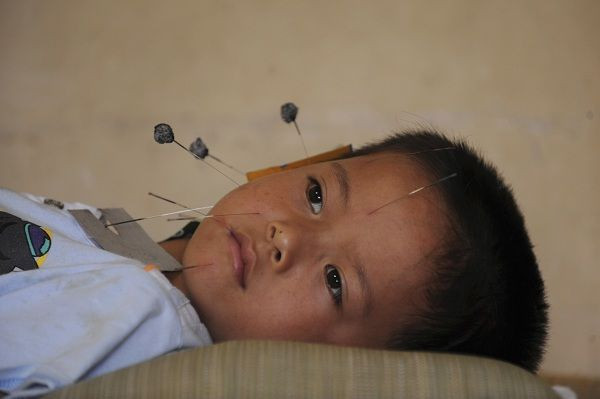Acupuncture in Children is Safe when Performed Correctly: Study

Pediatric acupuncture is safe when performed by appropriately trained practitioners, according to a study published today in the Pediatrics journal.
Researchers studied 1,422 patients and found that of the adverse effects associated with pediatric needle acupuncture, a majority of them were mild in severity, accounting for 253 of 279 adverse events. Mild AE included pain, bruising, bleeding and worsening of symptoms.
"Many of the serious AEs might have been caused by substandard practice," researchers Sunita Vohra, MD, MSc, of the University of Alberta in Edmonton, and colleagues wrote.
Those serious adverse effects accounted for 25 out of 279 adverse events (12 cases of thumb deformity, 5 infections, and 1 case each of cardiac rupture, pneumothorax, nerve impairment, subarachnoid hemorrhage, intestinal obstruction, hemoptysis, reversible coma, and overnight hospitalization).
Practice of Pediatric Acupuncture in the U.S.
Acupuncture, a 3,000 year-old therapy of traditional Chinese medicine performed by inserting special hair-thin needles into the skin at specific sites, is widely practiced in the United States and more than one-third of pain treatment centers provide acupuncture as a therapy.
However, it is used very rarely in the treatment of children but it has proven successful in treating chronic pain conditions without side effects, according to the Children's Hospital in Boston.
Some pediatricians that use acupuncture label the treatment as a "complementary therapy" and integrate it with Western medical treatments, according to the Childrens' Hospital website.
"Adding acupuncture sessions to antihistamine treatments, for example, can achieve comparable results to higher doses of the medication alone, while decreasing side effects such as drowsiness," writes the Children's Hospital in Boston.
"Similarly, post-operative acupuncture can reduce the nausea and vomiting caused by narcotic painkillers."
Acupuncture stimulates a neurobiological process that has analgesic effects. Those effects rely on production of endogenous opioid peptides, such as the endorphins and enkephalins, and stimulation of the endogenous descending inhibitory pathways, according to the Children's' Hospital website.
While acupuncture doesn’t reverse the pathology of disease, it has proven tremendously helpful in managing illness.
Doctor Yuan-Chi Lin, a pediatrician, anesthesiologist and pain specialist director of Children's Medical Acupuncture Service has a clinic that treats children for postoperative surgery and dental pain, sinusitis, bronchitis and asthma; gastritis, colitis, hiccups and constipation among others.
"The goal in my clinic is to decrease children’s pain and symptoms so that they may participate in activities at school, in sports and with their peers,” says Dr. Lin.
Children’s Hospital Boston has operated one of the most active pediatric medical acupuncture services in the U.S., according to their website.



























